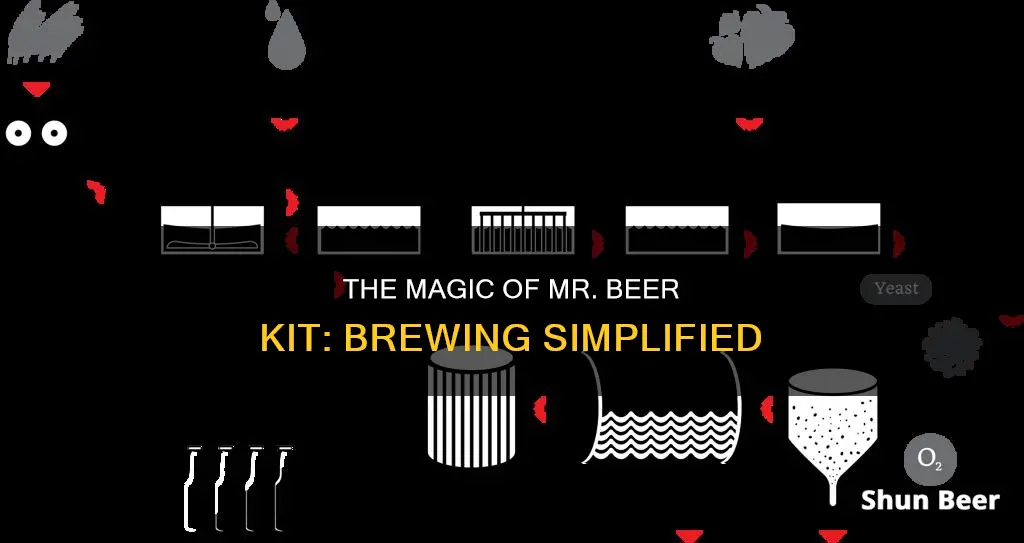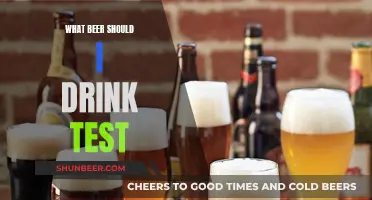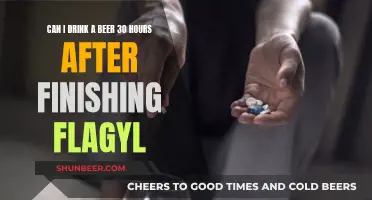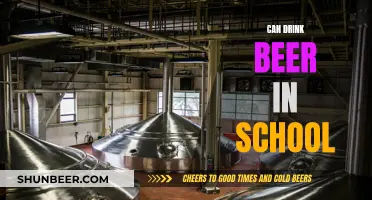
Mr. Beer kits are a great way to get into homebrewing. The kits include everything you need to brew and bottle 2 gallons of beer with their compact Little Brown Keg fermenter. The process is simple and involves mashing, sparging, boiling, fermenting, and bottling. The beer-making process is quick and easy, and with the help of their step-by-step instructions, online videos, live chat, email, and phone support, you will be guided every step of the way.
| Characteristics | Values |
|---|---|
| Time to brew | 30 minutes |
| Beer per batch | 2 gallons |
| Fermentation time | 10-14 days |
| Carbonation time | 7-14 days |
| Bottling method | Unique fermenter |
| Number of bottles | 8-11 |
| Bottle size | 1-litre |
| Number of recipes | Over 100 |
| Keg type | Compact, lightweight |
| Keg capacity | 2 gallons |
| Keg name | Little Brown Keg (LBK) |
| Keg features | Wide mouth, built-in airlock, locking spigot, UV-resistant |
What You'll Learn

Brewing process simplified
The Mr. Beer kit simplifies the homebrewing process, removing the difficult aspects without compromising on quality. The kit includes a fermenter keg, brewing extract, yeast, carbonation drops, cleanser, bottles, and caps. Here's a simplified breakdown of the brewing process:
Step 1: Assembly and Sanitization
Start by assembling the spigot and testing the keg for leaks. Sanitization is a crucial step to prevent off-flavours in your beer. Clean all equipment that will come in contact with the beer, including the keg, bottles, and utensils.
Step 2: Brewing
Combine the hopped malt extract with yeast and water. This process is simplified with the use of the brewing extract, which is produced by master brewers. Mix the extract with water to create the wort, then add the yeast. This begins the fermentation process, where the yeast breaks down sugars to produce alcohol.
Step 3: Fermentation
Store the keg in a cool, dark place at a steady temperature between 68°F and 78°F (20-26°C). Fermentation will take approximately 10 to 14 days. Do not open the keg lid during this process as oxygen can spoil the beer.
Step 4: Bottling and Carbonation
After fermentation, it's time to bottle the beer. Sanitize the bottles, then fill them with the beer and add carbonation drops or priming sugar. The remaining yeast will metabolise the sugar to create carbonation. Store the bottles in a cool, dark place for about two weeks to ensure full carbonation.
Step 5: Enjoy Your Beer!
Your beer is now ready to be enjoyed! You can expect the entire process to take about four weeks, including fermentation, carbonation, and conditioning. Remember to clean your equipment immediately after use to ensure your next batch of beer is just as good!
Beer Bar Memberships: Are They Worth the Cost?
You may want to see also

Affordable and reusable
Mr. Beer kits are known for their affordability, ease of use, and variety of original flavors. The kits are reusable and can be purchased at a low cost, making them an excellent choice for those interested in homebrewing.
The standard kit is designed to produce two gallons of beer per batch. After proper cleaning and sanitizing, it can be used multiple times by simply purchasing new refills. Mr. Beer offers a wide range of refills and recipes to choose from, allowing you to explore different styles of beer.
The kits come in two main varieties: the Starter Kit and the Complete Kit. The Starter Kit includes the essentials, such as a fermenter, brewing extract, carbonation drops, and a cleanser. On the other hand, the Complete Kit provides a full set of ingredients for a more comprehensive homebrewing experience.
Mr. Beer's brewing process is straightforward and simplified, allowing you to brew beer in less than 30 minutes. The kits include step-by-step instructions, online videos, and customer support to guide you through the brewing process.
The fermentation process, where yeast breaks down sugars to create alcohol, takes approximately 10 to 14 days. Bottling and carbonation add another week or so to the process. However, it is important to note that the beer will need to condition for a few weeks to ensure the best flavor and carbonation.
Mr. Beer kits provide an affordable, accessible, and enjoyable way to create your own beer at home. With their ease of use and variety of options, these kits are perfect for beginners and experienced brewers alike.
Beer Gas: How Does It Work?
You may want to see also

Starter and complete kits
Mr. Beer kits are known for their affordability, ease of use, and wide variety of original flavors. The kits come in two main varieties: Starter and Complete.
The Starter kit contains the bare essentials: a fermenter, brewing extract, carbonation drops, and a cleanser. It also includes bottles and caps for 256 ounces/8 liters of beer. The Starter kit is a great option for beginners, as it contains everything you need to get started with homebrewing.
On the other hand, the Complete kit features a full set of ingredients for quality homebrewing. It includes a fermenter keg, bottles, caps, labels, brewing extract, yeast, a no-rinse cleanser, and carbonation drops. The Complete kit is perfect for those who want to brew and bottle 2 gallons of great-tasting beer.
Both the Starter and Complete kits are designed to make the homebrewing process affordable and enjoyable. With Mr. Beer kits, you can brew a batch of beer in less than 30 minutes, and the beer will be ready to drink in 3-4 weeks. The kits are reusable, so you can keep brewing fresh, tasty beer at home.
Beer Tube Screens: How Do They Work?
You may want to see also

Fermentation and bottling
Fermentation
The fermentation process begins when you add yeast to the mixture of brewing extract and water (known as wort). The yeast breaks down the sugars in the wort, producing alcohol and carbon dioxide.
Fermentation takes place in the keg, which should be stored in a cool, dark place at a steady temperature between 68°F and 76°F (ideally between 70°F and 72°F) for the yeast to work properly. The ideal temperature is crucial: if it's too cold, the beer won't ferment, and if it's too hot, the yeast will produce off-flavours.
Fermentation will be complete in about 10 to 14 days. However, it's important not to open the keg lid during this process, as oxygen from the air can spoil the beer. After 10 days, you can taste a small sample to check if it's ready for bottling. If it tastes like flat beer, it's ready; if it's sweet, let it ferment for another four days.
Bottling
Before bottling, you need to sanitise your bottles to kill any bacteria or wild yeast that could cause unwanted flavours. To do this, fill each bottle halfway with a solution of lukewarm water and no-rinse cleanser, then shake and empty.
Once the bottles are sanitised, it's time to add carbonation drops or priming sugar to each bottle. The remaining yeast in the beer will feed on this sugar, creating carbon dioxide and causing the beer to carbonate. Fill the bottles to about one and a half inches from the top, then cap them tightly.
Store the bottles in a cool, dark place, and the beer will be carbonated within a week. However, it's recommended to wait for two weeks to ensure full carbonation. You can tell when the beer is ready by touching the plastic bottles; they will feel firm when fully carbonated.
Finally, it's essential to clean your equipment after use. Rinse all equipment with warm water, and consider using an unscented liquid soap or a specialised brewery wash to ensure a thorough clean. Avoid using scouring pads, wire brushes, sponges, or other abrasives, as these can create scratches that harbour bacteria.
Bottoms Up Beer Dispensers: How Do They Work?
You may want to see also

Carbonation and conditioning
Carbonation is the process of adding carbon dioxide to your beer to create that signature fizz. Mr. Beer offers carbonation drops, which are a convenient, no-fuss alternative to priming sugar. Each drop contains the right amount of sugar to carbonate your beer, and they can be easily cut in half using a pill cutter. The number of drops required depends on the size of the bottle. For instance, a 12 oz bottle would require 3/4 of a carbonation drop, while a 1-liter bottle would require 2 and a half drops.
If you don't have carbonation drops, you can use regular sugar. The amount of sugar required is the same as the amount of carbonation drops. However, it's important to note that sugar can be more difficult to measure accurately, and too much sugar can lead to over-carbonation and potential bottle explosions.
After carbonation, the next step is conditioning. Conditioning is the process of allowing your beer to mature and age, which helps to improve the flavor and smoothness. It also gives the yeast time to clean up any off-flavors. The ideal carbonation time is 14 days, and the beer should be refrigerated for 48 hours before drinking to stabilize the carbonation.
During conditioning, it's important to keep the bottles out of direct sunlight and at the right temperature. If the bottles are exposed to colder temperatures (below 70°F), they will take longer to carbonate. On the other hand, if they are exposed to warmer temperatures (over 78°F), off-flavors may be produced.
After the primary carbonation and conditioning, you can try your beer. If it doesn't taste quite right, you can leave the bottles out at room temperature for another week and try again. This is the process of conditioning, and during this time, the yeast left in your beer can help to clean up any off-flavors.
Beer Hair Wash: Does it Work?
You may want to see also
Frequently asked questions
The Mr Beer Kit comes in two varieties: the Starter Kit and the Complete Kit. The Starter Kit features the bare essentials: a fermenter, brewing extract, carbonation drops, and a cleanser. The Complete Kit features a full set of ingredients for quality homebrewing, including bottles and caps.
A standard Mr Beer Kit is designed to produce 2 gallons of beer per batch and is reusable.
The process includes mashing, sparging, boiling, fermenting, and bottling. It will take approximately 30 minutes to mix the brewing extract with water and add yeast. This will begin the fermentation process, where the yeast breaks down the sugars to produce alcohol. Fermentation will be complete in about 10-14 days. After fermentation, you can bottle and carbonate your beer.
The beer itself takes about 30 minutes to brew, 10-14 days to ferment, and another week or so to carbonate. In total, the process takes about 4 weeks from start to finish.
There are over 100 different Mr Beer refills and recipes to choose from. Some popular options include American Lager, Northwest Pale Ale, and Aztec Mexican Cerveza. You can also create your own recipes using the basic ingredients included in the kit.







